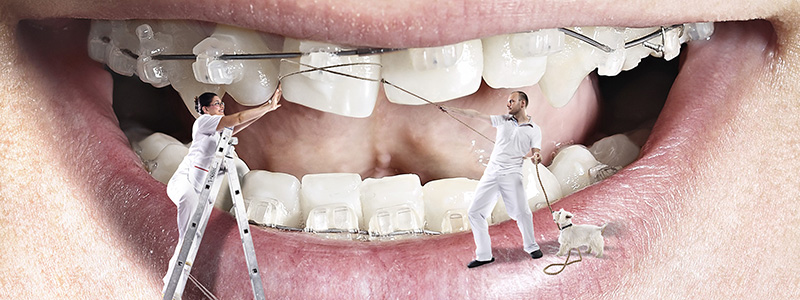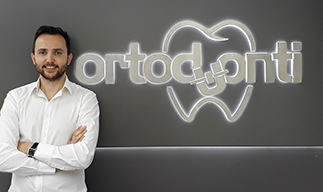Frequently Asked Orthodontic Questions

What is orthodontics?
Orthodontics is a specialty of dentistry. The word orthodontics consists of two Greek words 'Ortos' meaning straight and 'dontos' meaning teeth. In addition to providing an aesthetic appearance, orthodontic treatment improves chewing function, smile and corrects jaw positions. Orthodontics is popularly known as braces.
Who is an orthodontist?
An orthodontist is a dentist who specializes in the diagnosis and treatment of tooth and jaw irregularities. To become an orthodontist, it is necessary to first graduate from dental school and then complete a specialty or doctoral program that can take four years or more. During this training, the orthodontist learns the necessary information to control tooth movement (the general name of these interventions is orthodontics) and to guide jaw development (this treatment approach can be called jaw and facial orthopedics). Only dentists who have successfully completed this specialty or doctoral education can use the title of orthodontist.
How long does orthodontic treatment take?
Although the duration of orthodontic treatment (braces) varies according to the severity of the anomaly, it varies between 6 months and 3 years. Some bite disorders require single-phase treatment and some require two-three-phase treatment. Timely completion of orthodontic treatment and good results depend on a good teamwork between the patient, his/her family, family dentist and orthodontist.
At what age should you go to the orthodontist at the earliest?
Orthodontic problems begin to appear when permanent teeth begin to erupt at the age of 6-7 years. For this reason, the appropriate age for the first orthodontist examination is 7 years old.
Will my teeth straighten as I grow?
It is not possible to correct crooked teeth with growth. Especially after the age of 16, reductions in the size of the lower and upper jaws have been detected.
I am no longer a child, can I still wear braces?
Yes, brace therapy is also successfully applied in adult patients thanks to the advancement of technology .
What will be done in the first orthodontic examination?
After you fill out the forms given to you when you come to your examination appointment, your first examination is done. Necessary pictures and x-ray records are taken in order to make a correct diagnosis.
What will I learn at the first orthodontic examination?
You will learn whether there is an orthodontic problem, what to do to solve the problem, how long the treatment will take, and how much the treatment will cost.
Do braces hurt me?
In the first days of wearing the braces, there may be mild irritation on the inner surfaces of the lips and cheeks and pain during chewing on the teeth. However, these complaints go away in at least 1 week, and many patients even forget that they have a wire in their mouth. Wearing a wire is like wearing a new shoe. If you have a little patience, the wires are comfortable and well worth it.
Will braces decay my teeth?
Wires do not have a direct tooth decay effect. Since they only increase the nutrient accumulation, when the teeth are not brushed enough, they create a suitable environment for the formation of caries. That's why you should brush your teeth after every meal.
Do braces affect speech?
Braces generally do not affect speech. Some braces used within the movement limits of the tongue may adversely affect speech in the first days after insertion. However, this situation disappears as the language adapts to the region again.
How often will I have appointments during orthodontic treatment?
The treatment time will not be shortened by coming to the sessions more often and excessive stretching of the braces in your mouth. On the contrary, this will damage your teeth and may prolong the treatment. For this reason, orthodontic patients are not given an appointment before 4-6 weeks, except for some special cases.
Will the teeth deteriorate again after the treatment is over?
After the braces are removed, the teeth want to return to their previous positions. For this reason, after the treatment is finished, a fixed or mobile reinforcement device should be made. If these appliances are not used within the recommended times, the teeth may deteriorate again.
Is it okay to have a tooth extracted for treatment? Are treatments without tooth extraction more advantageous?
Tooth extraction for the purpose of orthodontic treatment is not preferred by patients. In deciding on tooth extraction, criteria such as the amount of crowding in the lower and upper jaws, the growth pattern of the lower and upper jaws, and the patient's facial profile are taken as a basis. Tooth extraction may be required for a successful orthodontic treatment, where the result will be more stable.
My child sleeps with his mouth open at night and snores. Will this damage the tooth structure?
Yes. Mouth breathing for a long time causes the upper jaw to narrow, the child's face lengthening and the inability to close his lips. This situation, which needs great attention, should be resolved by consulting an ENT specialist at an early age. Adenoids, which cause mouth breathing by blocking the nasal passage, do the damage they will do, even though they get smaller as the child grows. For this reason, it is recommended to be surgically removed as soon as they are seen.
Can my dentist straighten my teeth?
Orthodontic treatment is performed only by orthodontists. In order to become an orthodontist, it is necessary to take 4 years of orthodontic education following dentistry education. Orthodontists are specialists who straighten teeth and provide correct form and function. An orthodontist is a specialist who provides orthodontic treatment to hundreds of patients. It is not possible for dentists to see and follow so many cases.
How often should I brush my teeth during orthodontic treatment?
Brushing after every meal and before going to bed at night is very important for the treatment to end quickly.
Will brushing damage my braces?
You certainly cannot damage the braces with a brush. As you brush with sufficient frequency and strength, your gums will be healthier and will respond better to the treatment applied. Maybe your treatment can end much faster this way. :)
Is there anything I shouldn't eat during orthodontic treatment?
Avoid acidic beverages such as cola and fanta, hard foods such as hazelnuts, peanuts, roasted chickpeas, sticky foods such as chewing gum and soft candy, hard and crunchy foods such as chips and toast and foods with seeds such as plums, cherries and olives.
Is injection done during orthodontic treatment?
It can't be done.
What is an emergency appointment?
It is normal for the braces to sink hurt your cheek during the first few days of getting used to after the braces are attached. You can close the orthodontic candles that will be given to you on the wires. If your braces are sticking to your cheek when they break, call your doctor and make an appointment, if not, wait for your next appointment.
Are there any invisible braces?
In recent years, the use of tooth-colored porcelain braces, which attract less attention than metal braces, has increased. In addition, bracessystems (lingual braces) placed on the tongue-facing surfaces of the teeth have been developed.
Will there be any stains on my teeth after the braces are removed?
If you brush your teeth regularly throughout the treatment, no stains will remain.
My child sucks his thumb at night. Is this harmful?
Habits such as thumb sucking, nail biting, lip sucking or biting, and use of false pacifiers, which we call bad habits, should be stopped until the child is 4 years old. If it continues, the disorders caused by these habits become permanent and the child needs serious and long-term orthodontic treatment. If your child has thumb sucking, it would be beneficial to see an orthodontist.
Is orthodontic treatment necessary?
Orthodontic treatment, by correcting the crowding in the teeth and the incompatibility between the jaws is not only for aesthetics, but also helps to prevent possible future gum diseases and problems in the lower jaw joint, as well as to correct chewing function and impaired speech.
What is the goal of orthodontic treatment?
Basically, the main goals of orthodontic treatment are correction of chewing function, correction of speech function, helping to provide better oral hygiene, providing aesthetics and providing psychological support by increasing the patient's self-confidence in society.
What is orthognathic surgery?
Orthognathic surgical treatment is the surgical treatment applied for patients who are not satisfied with their facial appearance. In adult patients whose growth and development period is over, incorrect jaw positions cannot be corrected only with orthodontic treatment (wire treatment). Along with wire treatment, the intervention of a plastic surgeon is required. Orthognathic surgical treatment is becoming more and more widespread thanks to the awareness of the society in this regard and technological advances. Dr orthodontist adult surgery last two animations
What is reinforcement therapy?
Orthodontic treatment takes about 2 years. After orthodontic treatment, teeth tend to return to their old positions from their new positions. To avoid this (until the reorganization of bone and surrounding tissues is complete), the teeth should be kept in their corrected position. For this purpose, mobile or fixed reinforcement devices are used. Image hawley and retainer,
Are braces expensive?
Orthodontic treatment is not an expensive treatment considering its long-term physical and psychological benefits. Many Orthodontists offer convenient payment options to patients. Braces prices vary from case to case.

